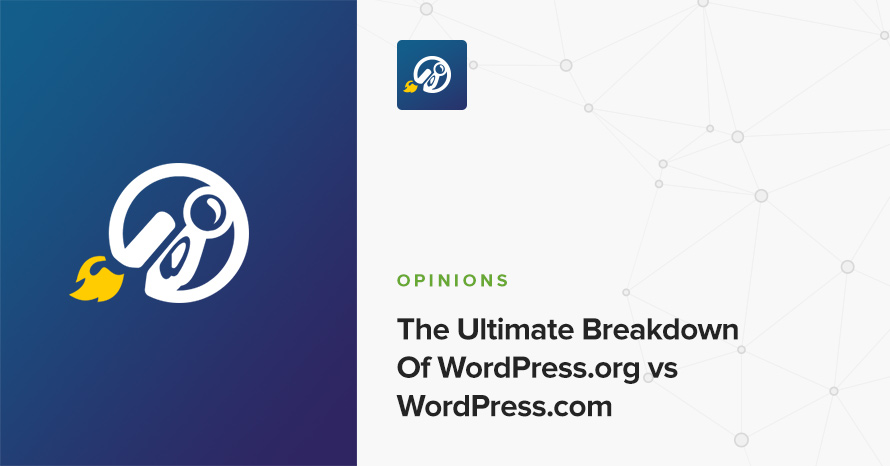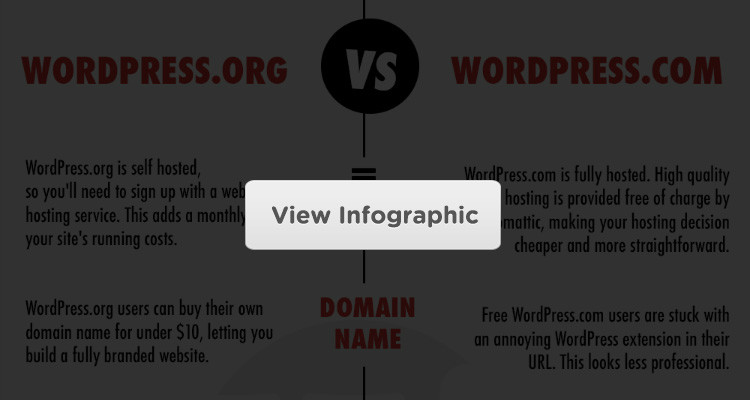The Ultimate Breakdown Of WordPress.org vs WordPress.com

This is for the curious people out there. The ones who are more prone to do their research before spending time and money on something that could potentially make them an income in the future.
If you’ve just started looking into making a website, chances are you have lots of questions about getting started online. For example, you may wonder why a tool like WordPress is completely free. Is it worthy to hold your precious website?
You’ll also encounter questions about hosting, themes, plugins and more; but one of the biggest dilemmas people have when starting a WordPress website is whether to go with WordPress.org or WordPress.com.

Some of you may know quite a bit about this WordPress.org vs WordPress.com battle, while others are scratching their heads. It does seem confusing that they would give almost identical names to completely different systems. Regardless, keep reading for the ultimate breakdown of WordPress.org vs WordPress.com.
A Brief Introduction to the WordPress.org vs WordPress.com Showdown
I could write for days when it comes to the differences between WordPress.org and WordPress.com. However, a few distinguishing features allow for us to truly compare the two, since these areas are generally most important to webmasters in general.
So, what areas will we compare when looking at WordPress.org vs WordPress.com?
- WordPress Hosting and domain names
- WordPress themes and available plugins
- How much control you have over your site
- Monetization opportunities
- Security and maintenance options
Let the showdown begin…
Hosting and Domains: WordPress.org or WordPress.com?

The largest difference between these two options comes into play with hosting. In short, WordPress.org is self-hosted, while WordPress.com is fully hosted by Automattic, the owner company of WordPress.
What does this mean?
Since WordPress.org is self-hosted, it means that you must run the show. You have the benefit of owning, and controlling, all the content on your site, but it’s kind of a pain to install WordPress on a hosting account. It also brings about monthly or yearly payments.
The fees vary, but Bluehost is known for offering $4 per month, while options like WP Engine start at around $25 per month. Although installing WordPress on a hosting service has become easier over the years, less technical people will still find this a nuisance.
Since WordPress.com is fully hosted, this means that you don’t have to to worry about installing WordPress on a hosting service. All of this hosting comes for free, and you generally don’t have to worry about security issues or downtime, since the hosting is of the highest quality. However, as we’ll discuss below, you lose some control of your site with this setup.
Keep in mind that the big saving grace for WordPress.org is when you start looking into domain names. Generally you buy a domain name when signing up for hosting, but with WordPress.com you have little chance to brand your site and make it look professional.
For example, lets’s say you have a site called John’s Cool Caps.
- With WordPress.com your domain looks like this: johnscoolcaps.wordpress.com.
- With WordPress.org your domain looks like this: johnscoolcaps.com.
The Consensus: Even though you sacrifice control of your site and the domains look bad, the fully hosted option is so easy to work with. WordPress.com wins this one.
WordPress Themes and Plugins: WordPress.org or WordPress.com?

I like to compare WordPress.org to an iPhone. When you buy a phone, it doesn’t have much on it. In fact, you could argue that it’s fairly boring until you start installing apps. These apps comes in the thousands, allowing you to perform just about any task you could think of.
This is what plugins and themes are for on WordPress.org. Since you’re required to self-host with WordPress.org you get access to any third-party plugin or theme, allowing you to complete anything you want with your website. From contact forms to image resizing plugins, your options are endless.
On the other hand, WordPress.com is rather limited. Using the iPhone analogy, WordPress.com is similar to buying an iPhone and only receiving stock apps, without the ability to download your own from the app store.
Yes, WordPress.com has a few plugins included by default, but not many. For example, a basic WordPress.com install has social sharing buttons for you. In short, when using WordPress.com you’ll start wondering how another site did something cool, only to find that a third-party plugin was responsible.
It’s also worth noting that WordPress themes, the files that you install to make your site look pretty, are unlimited with WordPress.org. Choose from third-party themes, install some free ones or even make your own if you have the skills.
WordPress.com theme options are limited to the WordPress collection. At the time of this article the collection has 362 themes, which isn’t bad, but it’s nothing compared to an entire internet filled with people making WordPress themes.
The Consensus: WordPress.org is the clear winner here, since plugins and themes are what make WordPress truly great.
Site Control: WordPress.org or WordPress.com?

As we mentioned above, the WordPress.com hosting option is much easier and faster to implement. However, going the easy route leaves you with a mess of control and freedom problems.
To start, here are a few of the WordPress.com restrictions because of the its hosting option:
- Video storage is non-existent
- WordPress may reveal ads that you don’t get paid for
- You only receive 3GB of space
This part also ties into the domain names, since you would probably prefer a shorter, more professional domain name, as opposed to one that brands the WordPress name, right?
Keep in mind that WordPress.com users have the option to upgrade their plans, but then you start paying fees that move dangerously close to a WordPress.org site, yet you will still never have the capabilities of a site like that.
The Consensus: The freedom to do whatever you want with your site and control every aspect is a blowout win for the WordPress.org side. Imagine having to force your visitors to see ads on your site, while still not getting any compensation for that? It’s insane.
Monetization Opportunities: WordPress.org or WordPress.com?

To start this section, it’s worth just coming out and saying that monetization is extremely difficult and restricting on WordPress.com.
If you plan on becoming a serous blogger or making money in any way through your website, WordPress.org is the only way to go.
Why is this the case? Because WordPress websites have dozens of monetization options, but you need the freedom of self-hosting and the versatility of WordPress plugins to make it happen.
What are some ways to monetize your site?
- Placing ads (like Adsense) on the site
- Affiliate commissions
- Selling space for ads
- Email marketing efforts
- Selling memberships
- Selling services, physical or digital products
This basically means that any type of business can work through WordPress.org and make money. The reason it’s so easy to implement these money-making tactics in the WordPress.org system is because of plugins. Each of these tactics have dozens of plugins to help you implement a system and start accepting money or selling items.
For example, the email marketing industry is filled with plugins to bring in more subscribers, monetize these subscribers and send out email newsletters in the process.
The Consensus: Although you can in fact monetize a WordPress.com website, it’s a rather miserable process, and it usually just has something to do with placing ads on your site. That said, WordPress.org is the only way to go if trying to make money with your site.
Security and Maintenance: WordPress.org or WordPress.com?

Interestingly enough, when I started blogging I just assumed that a self-hosted site was more secure. In theory, a self-hosted WordPress.org site has the potential for strong security, but the unfortunate reality is that most webmasters neglect their websites, with little maintenance and few security measures.
With WordPress.com, the WordPress owner Automattic offers a pretty nice security package for free. Most of the maintenance is completed without you even knowing and the company also keeps out unwanted visitors.
With a WordPress.org website, you must clean up your databases, comments, spam posts, outdated themes and plugins and anything else that might open your site up to attackers. Its usually best to install plugins for this, but you can complete maintenance and security yourself if you have the knowledge.
The Consensus: WordPress.com is much easier to maintain and protect. However, its worth noting that WordPress.org is fairly simple to maintain and protect as well, but most people don’t take the time.
Which One is the Victor?
Although the hosting is easier to setup and you don’t have to worry about security, WordPress.com falls short on so many levels. I would argue that if you simply plan on sharing your travels or journaling about your hobbies, go with a WordPress.com website to save some money and hassles.
However, if you have any intention of making money or becoming a serious online content creator, a self-hosted WordPress.org site serves as the dominant content management system for you.
Want a Cool Infographic to Print and Post on Your Wall?
WPKube offers a wonderful infographic outlining a few of the primary categories that you may want to compare when thinking about choosing between WordPress.org and WordPress.com.
That’s it for learning the primary differences between WordPress.com and WordPress.org. Please feel free to drop us any questions in the comments section below, since I know this topic takes a little while to absorb if you’re new to building websites.
Other resources
firstsiteguide.com have put together a resources page where they included many helpful resources that come handy to anyone who is about to enter an online world.
Dev Sharma is a WordPress enthusiast and founder of WPKube, a WordPress blog which focuses on WordPress Themes, Plugins, Tutorials and Modifications.
